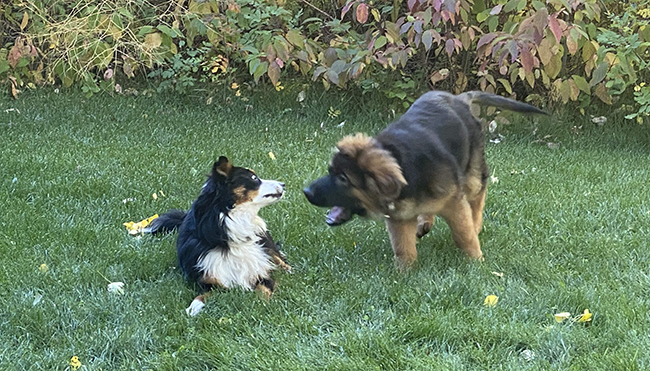
By Fran Jewell
Recently, I have been so dismayed by the lack of EARLY dog training with puppies. I am not sure where this is coming from, but early training and socialization is imperative to have a dog you can live with.
What do I mean by EARLY? Before 16 weeks of age! Not AFTER they have finished their shots. By then, puppies have missed a critical imprinting period that helps them to live comfortably in our world. If puppies are not socialized with people, other dogs and new places during this period, they may fear them the rest of their lives. A fearful dog is NOT easy to live with and can eventually become fear aggressive.
When I talk about socializing with people, I mean both adults and children. Include people that are disabled and maybe in a wheelchair, on crutches, or using a walker. If dogs are not introduced to all of these things before that 16-week period is over, it can creates a plethora of problems later on.
These experiences must be positive ones, which mean you have to take the responsibility to provide SAFE socialization. It does NOT mean taking your puppy to the DOG PARK and letting other dogs run up to your puppy and terrorize or bully him. It means letting your puppy have safe experiences with fair, friendly and healthy dogs that belong to your friends in a virus-free environment such as a fenced-in backyard. It also means asking your friends with dog-experienced children to help provide positive experiences with youngsters. Borrow a wheelchair, walker, cane or crutches from someone to let your pup see. Put pieces of food on them so the pup will go up, sniff the equipment and get rewarded for it. Wear silly hats, dark glasses and floppy clothes, or Halloween costumes, so your pup understands it’s alright and not something to bark at or shy away from. Have a puppy party, where you ask all your friends to come over in 10-minute intervals to have a cracker-and-cheese party, where you can have your puppy sit nicely for treats upon each person’s arrival. Be sure you invite everyone — male, female, and children. Leave other dogs home for another time.
As for training, the more you can teach your dog before the 16 weeks is up, the easier it is to work with your dog as s/he hits his/her “teenage years,” meaning from six months to a year old.
ALL dogs go through this period where they test you and what you are going to do about everything — whether they really have to come when they are called, or if they HAVE to sit by the door instead of bolting out into the street. Imprinting behaviors like “leave it” and “come” are critical at this time, as well as how to walk nicely on a leash.
THE LONGER YOU WAIT TO TRAIN, THE HARDER IT IS because you have to UNDO all the bad behaviors your dog learns during that 16-week period to replace them with the good behaviors. TRAINING TAKES LONGER THE LONGER YOU WAIT. Just like human babies, give your pup the BEST start in life.
Fran Jewell is an IAABC Certified Dog Behavior Consultant, NADOI Certified Instructor and the owner of Positive Puppy Dog Training, LLC in Sun Valley. For more information, visit positivepuppy.com or call 208-578-1565.
